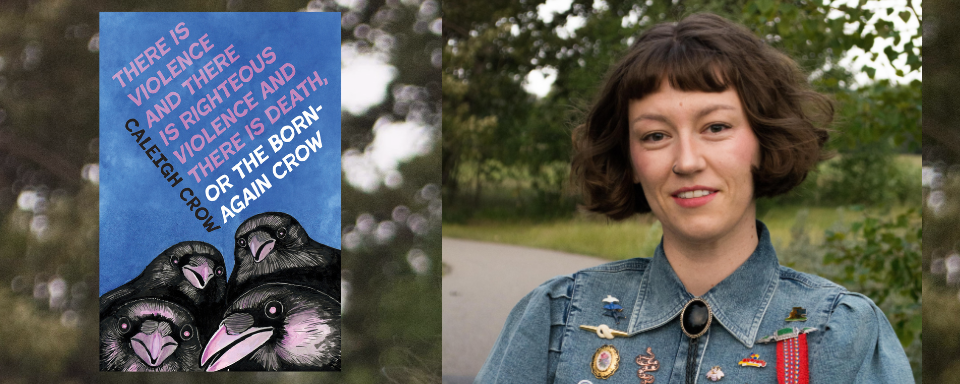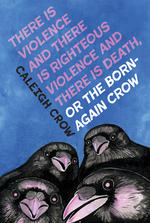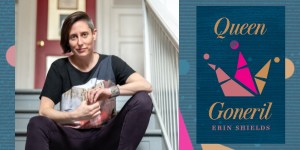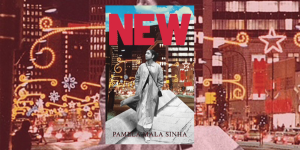
Author Interview: Caleigh Crow
Get to know the firebrand playwright Caleigh Crow in our new author interview as we pick her brain about birding, class struggle and her stunning debut book There is Violence and There is Righteous Violence and There is Death or, The Born-Again Crow.
In addition to being a published author, you’re also an accomplished independent theatre creator through your work as the co-founder of Thumbs Up Good Work Theatre with your sibling, Colin Wolf. Can you tell us a little bit about your experiences as a DIY artist and the ethos that drives the work you produce?
Caleigh:
We both graduated university with our undergraduate degrees within a few years of each other and both realized that if theatre was something we really wanted to do, we were going to have to make something happen ourselves. We then quickly learned just how difficult (read: expensive) it is to produce theatre, especially as two individuals without much of a network to lean on, and given that we also had to work full time to continue to pay for our survival needs such as rent, groceries, phone bills, etc. Our current neo-liberal, capitalist organization of the economy undervalues art as it has difficulty commodifying the ephemerality of live performance, though it has made strides in the rent-seeking economy that surrounds our work—after all, what is a theatre if not prime real estate? Still, we were able to raise funds through bake sales and eventually from the landscaping company my brother started and then we were off, making theatre on very small scales, to very small audiences, but the lessons and experience of self-producing have paid off in spades as my career has gone on. I encourage all emerging artists, especially actors, to give it a try, or at least to look into it, just to see how much labour (for us, entirely unpaid) goes into producing a play. It was worth it, but it came at a cost, as does all art.
The ethos behind it all is that no matter how hard it was, we kept reminding ourselves that we believe that everyone has the right to be an artist and, even further, that everyone owes it to themselves to develop and maintain a creative practice. We owe it to our souls, our hearts, and to each other, that we are not alone, that we are not alienated from our own lives, and that change is possible (both within and without), and that love is real. These are ideas that capitalism tries to take away from us. We must resist. We must intentionally take our lives back, and do what the state and capitalist class have made seem impossible.
The crow has a rich history of symbolism and superstitions across cultures, it’s also your last name. How is the crow significant to your life and this particular story?
Caleigh:
Back when I was a baby birder, crows were an important gateway to the hobby for me. They are prevalent in Calgary, all year round, meaning that my earliest birding experiences were observing and listening to crows and magpies. I am, like so many others, intrigued by animals that have societies and generational memories—they challenge assumptions that this planet was made to be dominated by our superior species. And yet crows have a very different morality than we do, if they have one at all. They do creepy things. The collective noun for their species is a murder. They kill and they steal. They are intelligent: their funerals and the way they reward us for doing their bidding. Fascinating. Of course, they are one of the commonest birds, and part of that very special family of corvids, so to me it makes sense that there are a number of myths, legends, and personality traits assigned to them by a myriad of cultures worldwide. That is significant to me. I am now a more seasoned birder, and I understand that it will take a lifetime of observation, of witnessing, to unravel fully what this means for me.
For our story, I am interested in the challenge an intelligent crow society presents for humanity. What is goodness, and how/why do we aspire for purity? What does it mean to be other? How can we confront the shadow self, the crow self, that lives inside all of us—that we are all a few random unforeseen circumstances from the “bad” selves that exist in all of us? What does it mean to fully change your circumstances—when do you have to just fly away from it all?
I have no answers. But hopefully, the play provides one possibility.
When Born-Again Crow first premiered in 2019 at Arts Commons, you portrayed the play’s heroine, Beth. Are there parallels between yourself and the main character?
Caleigh:
Yes, I was very angry at my working conditions. Very angry that I had to dedicate a significant amount of my time to menial work that generates value and wealth for everyone except me, and my co-workers. I was thinking a lot about my co-workers—from my retail jobs, and from the cleaning company I was working for at the time—people who I feel were all so much more than the work they were doing, who all had passions and families they’d rather tend to, but who managed somehow to remain contented. I wish I had that ability—for me, every day it was like, completely Kafkaesque how difficult living every day was. I wanted out. Beth is a lot like that, I think. I like to think I have a little bit more resiliency, and Beth is sometimes very snobby—she makes assumptions that everyone is doing everything on purpose. She does not realize that Jim, from the HOA, is as trapped (by capitalism, by gender) as she is. But yes, she is definitely an expression of my shock and horror that our society has not progressed past work or death as an organizing principle.
But you know, this goes back to being DIY also—we could not afford to pay for rights to plays, so I decided to write one for free.
You’ve said your work leans towards themes of metaphysics, class struggle, magic, and serious whimsy. If you possessed supernatural powers that could help you destroy the evils of capitalism, what would they be and how would you use them?
Caleigh:
I wish it was just a button—a big red button—and all it would take is one special person to push it. I have joked about a Marxism-Understanding-Beam possibly making an appearance in my other works. But too many people love capitalism way too much to give it up willingly. It’s so intensely psychological, it might actually be an illness, like a mass delusion or something, or like, a species-wide reaction to pain and trauma. It’s much more fun to write about than it is to think about in the real world. I become much less cynical in my writing. The end of capitalism will probably be the result of plain old elbow grease and love on the part of some very dedicated people—nothing supernatural at all. I think actually planet Earth is doing a pretty good job at destroying capitalism on its own right now—nothing more natural than that. I wish her and the crows all the best.
As we witness global injustices increasing day by day, it is becoming apparent that those who perpetuate harm through wars, wealth hoarding, and lethal carbon emissions will not be stopped by their own volition or even made accountable through their own governments. They must be stopped by external forces. In the ongoing fight for collective liberation, do you think righteous violence is justified?
Caleigh:
Yes.
***
Order your copy of There is Violence and There is Righteous Violence and There is Death or, The Born-Again Crow today!
Caleigh Crow is a queer Metis theatre artist from northeast Calgary. Previous playwriting topics include a talking crow and a grocery clerk, the mass coronal ejection of 1859, the Antifa supersoldier, the intersection between twelfth century Franciscan nuns and Britney Spears, remote viewing, witch revenge, and a landlord musical. She is the co-founder and artistic lead of Thumbs Up Good Work Theatre. Her work tends towards themes of metaphysics, class struggle, magic, and serious whimsy.



Comments